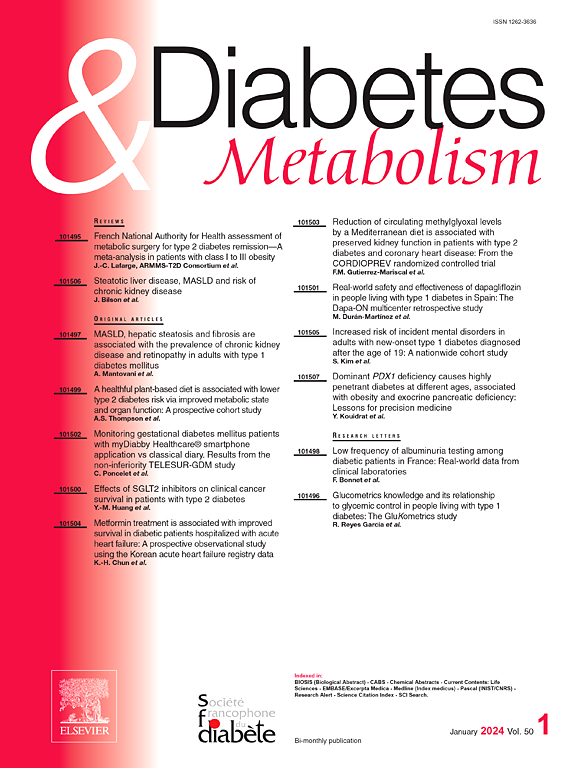SGLT2抑制剂对Prader-Willi综合征的血糖和肾脏影响:益处和风险
IF 4.7
2区 医学
Q1 ENDOCRINOLOGY & METABOLISM
引用次数: 0
摘要
目的:钠-葡萄糖共转运蛋白-2抑制剂(SGLT2is)广泛用于2型糖尿病(T2D)治疗,但其在Prader-Willi综合征(PWS)中的疗效和耐受性尚不清楚。考虑到糖尿病的早期发病和治疗挑战,在这一人群中评估SGLT2is是必要的。研究与方法:在这项回顾性的多中心研究中,48例成人PWS合并T2D患者,其中24例接受SGLT2is,随访超过6个月。在基线和6个月时分析血糖和肾脏参数。结果:SGLT2i组HbA1c升高且显著改善(P < 0.05),而对照组保持稳定。白蛋白与肌酐比值也显著降低。没有发现明显的体重变化。不良事件发生率为37.5%,其中急性肾损伤发生率为8.3%。结论:SGLT2is改善了PWS患者的血糖控制和肾脏指标,但没有体重减轻。密切的安全监测是必要的,特别是关于PWS患者的肾功能,更普遍的是针对所有伴有神经发育障碍的复杂肥胖。本文章由计算机程序翻译,如有差异,请以英文原文为准。
Glycemic and renal effects of SGLT2 Inhibitors in Prader-Willi syndrome: Benefits and risks
Objective
Sodium-glucose cotransporter-2 inhibitors (SGLT2is) are widely used in type 2 diabetes (T2D) management, but their efficacy and tolerance in Prader-Willi syndrome (PWS) remains unknown. Given the early onset of diabetes and treatment challenges, evaluating SGLT2is in this population is essential.
Research and methods
In this retrospective, multicenter study, 48 adults with PWS and T2D, among whom 24 patients receiving SGLT2is, were followed over 6 months. Glycemic and renal parameters were analyzed at baseline and 6 months.
Results
HbA1c was higher in the SGLT2i group and significantly improved (P < 0.05) while it remained stable in controls. The albumin-to-creatinine ratio also decreased significantly. No significant weight change was noted. Adverse events occurred in 37.5 % of treated patients, including acute kidney injury in 8.3 %.
Conclusions
SGLT2is improve glycemic control and renal markers in PWS with no weight loss. Close safety monitoring is warranted, particularly regarding renal function in PWS and more generally towards all complex obesity with neurodevelopmental disorders.
求助全文
通过发布文献求助,成功后即可免费获取论文全文。
去求助
来源期刊

Diabetes & metabolism
医学-内分泌学与代谢
CiteScore
12.00
自引率
4.20%
发文量
86
审稿时长
13 days
期刊介绍:
A high quality scientific journal with an international readership
Official publication of the SFD, Diabetes & Metabolism, publishes high-quality papers by leading teams, forming a close link between hospital and research units. Diabetes & Metabolism is published in English language and is indexed in all major databases with its impact factor constantly progressing.
Diabetes & Metabolism contains original articles, short reports and comprehensive reviews.
 求助内容:
求助内容: 应助结果提醒方式:
应助结果提醒方式:


